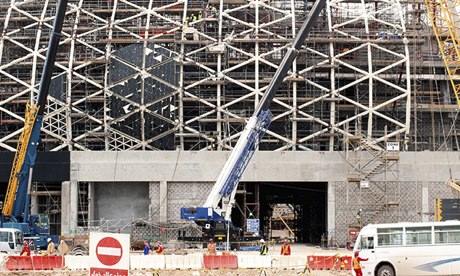Qatar is to publish a report into claims of widespread abuse of migrant workers revamping Qatar for the 2022 World Cup within the next few weeks – as organisers prepare to start work on the first of 12 stadiums.
 The much-anticipated report was commissioned by Qatar's leaders in early October after a series of Guardian stories that detailed widespread labour abuses, including dozens of deaths, and claims that conditions at some sites amounted to modern day slavery.
The much-anticipated report was commissioned by Qatar's leaders in early October after a series of Guardian stories that detailed widespread labour abuses, including dozens of deaths, and claims that conditions at some sites amounted to modern day slavery.
The alleged abuses generated widespread international outrage, and were condemned by international labour groups, trade union bodies, and football's organising body, FIFA, which pledged to further scrutinise plans for the event, won by the tiny Gulf state three years ago.
Qatar's World Cup organisers also reacted with alarm, introducing labour market reforms that aim to enshrine workers' rights and welfare conditions.
The labour ministry asked international law firm DLA Piper to explore the allegations, which had centred on some workplaces in a $54bn (£33bn) development known as Lusail City, 15 kilometres north of Doha.
Work will begin in January on the 40,000 seat al-Wakrah stadium that will host qualifying finals.
World Cup organisers estimate that at least another 55,000 to 80,000 labourers will be needed to build all 12 venues. Tens of thousands more will be needed to complete a massive array of infrastructure projects, including train lines, a road network, hotels and malls. The overhaul, valued by some estimates at close to $100 billion, will be among the biggest and most ambitious to be taken undertaken anywhere.
As is the case elsewhere in the Middle East, labourers are sourced largely from some of the world's poorest countries, including Bangladesh, India and Nepal. Qatar and other Gulf states are among the richest per capita nations on earth.
Nepalese construction workers were said to be dying in Qatar at a rate of around one per day, many from heart attacks, during the brutal Gulf summer, figures supplied to the Guardian revealed.
World Cup organisers insist that none of the abuse allegations centre on sites directly under their purview, however the raft of building projects will directly support the tournament – the biggest event in the country's history.
Speaking last week at a sport and cultural conference in Doha, Hassan al-Thawadi, secretary general of the Qatar 2022 supreme committee, reaffirmed the country's commitment to labour reforms. "When can you judge worker's welfare? I don't think you can set any timeline because it depends on each different nation and the level they are in," he said.
"We have awarded our first contracts for early work on the al-Wakrah Stadium and I am very proud to say that it contains in it provisions for our workers welfare standards and addresses issues from accommodation to remuneration."
Another senior Qatari official, who did not want to be named, said the spotlight on migrant labor could act as a force for change across the Gulf, where expatriates often account for more than 70 per cent of workforces.
"We have a big incentive to get this right," the official said. "There is understandable scrutiny on how we are doing things and that should act as a conduit to look at labor issues across the region. We will not let this define us."
Expatriates are usually employed under a sponsorship system known as kafala, which binds them to their employer and often prevents them from leaving the country until their contracts are finished.
Such a system is employed across the region and its use is defended by Gulf states, which claim that sponsored visas with strict conditions are a standard form of entry for workers to many European states.
Labourers in Doha interviewed by the Guardian last week say being tied to their employers is one of their main fears, along with living in festering accommodation quarters and having salaries withheld.
One Nepalese worker, who arrived in Qatar last summer, said conditions had improved for him and his colleagues since the revelations. "That is partly because of the winter, which makes it much easier. But it's also because the bosses are worried.
"They feel the eyes of the Qataris for the first time. Our bosses are not from here. They are Indians, or Arabs from Jordan, and Lebanon. They are the middle-men. They have been out of control, but now they are scared."
No comments:
Post a Comment